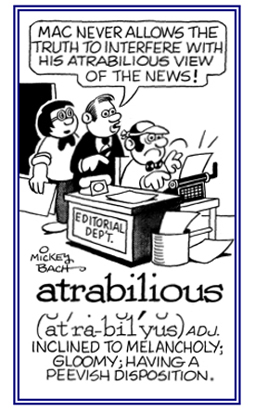bili-, bil- +
(Latin: bile; which is a digestive juice secreted by the liver, stored in the gallbladder, and aids in the digestion of fats)
2. Melancholic or hypohondriac; from the supposed predominance of black bile, to the influence of which ancient medics thought caused hypochondria, melancholy, and mania.
2. Characterized by being easily angered or irritated; peevish; bad-tempered: Peter's father lost his job because of the bad economy and, as a result, he has an atrabilious attitude about life in general.

Go to this Word A Day Revisited Index
so you can see more of Mickey Bach's cartoons.
2. Affecting a bile duct or the system of ducts in the liver.
3. A reference to the gallbladder, bile ducts, or bile.
The biliary system itself consists of the gallbladder and bile ducts and, of course, the bile; for example, biliary atresia is the absence or closure of the major bile ducts, the ducts that drain bile from the liver.
It is composed of a mixture of the sodium salts of the bile acids.
The term bilious also indicates a peevish or an ill-natured disposition.
The word bilious goes back to the old belief that there were four bodily humors, black bile, yellow bile, phlegm, and blood, and these four humors determined a person's temperament.
Bilious was the personality type associated with an excess of yellow bile.
2. Etymology: bilious derives from the French bilieux, which in turn came from bilis, the Latin term for "bile".

Go to this Word A Day Revisited Index
so you can see more of Mickey Bach's cartoons.
2. A pigment produced when the liver processes waste products.
A high bilirubin level causes yellowing of the skin.
2. A green pigment found in bile which is formed during haem catabolism (when organisms convert substances into excreted compounds), mainly the breaking down of old red blood cells, within the liver.
It transforms into the red-orange bile pigment bilirubin. A high bilirubin level causes yellowing of the skin.
A sufficient elevation will produce jaundice. Some degree of hyperbilirubinemia is very common in babies right after birth, especially premies.

